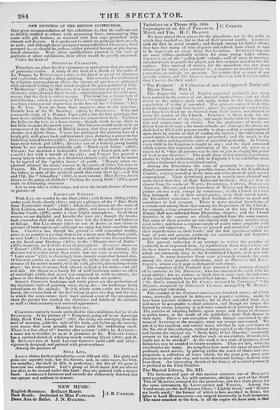The disgraceful state of English parochial psalmody. Les often been
noticed in the course of our musical humbrations ; end we shall revert to the subject again and again, rather in the hope than the expectation of seeing it amended. The primary cause of its decline must be sought at our Universities ; where the springs of sacred musk, Lave long been dried up or diverted from their course, nor allowed to water the garden of the Church. Provision is there made fur the musical instiuction of the clergy, and ample funds exist for the educa- tion and maintenance of choirs. But the professors of music are driven from their seats ; the music-schools are shut up ; the choirs arc abolished or filled with persons unable to sing—a duty as much enjoined upon them by statute as that of reading the service ; the cultivation of sacred music is discouraged, almost proscribed ; and the result is the present Wien and degenerate state of parochial psalmody. In Prussia every child in the kingdom is taught to sing ; and the royal command which enjoins this universal cultivation of the vocal art, gives as a reason for it, "that all persons may be able to join in singing the praise of God in our churches." The result there is that parochial psalmody attains its highest perfection, while in England it is an exhibition more worthy a barbarous than a civilized nation. Among the Dissenters, the state of psalmody is often better, though sometimes as bad, or, if possible, worse, than in the Established Church; varying according to the taste and refinement of each several
congregation. Their devotional poetry is usually more elevated and more varied than that of their Episcopal brethren ; they are free to choose from the works of WATTS, DODDRIDGE, Cowri:it, BARBACID, A milieux, Maros:, and even from those of WEBER and MANT, psalms are not used, except by connivance, in the Church to which they belonged. As in their sacred poetry, so in their sacred music. the Dissenters sometimes turn their freedom of choice to good and sometimes to bad account. There is more musical knowledge of a certain sort among them than among the frequenters of the Church : for example, a large proportion of the chorus at the late Festival in Exeter Hall was collected from Dissenting chapels; and the Choral Societies in the country are chiefly supplied from the same source. But many of these persons are not content with singing merely—they must write; and hence a copious supply of psalm tunes pregnant with blunders and vulgarisms. These are printed and circulated " with all their imperfections 011 their heads," and the few specimens which we have of pure and genuine psalmody are overwhelmed and forgotten under this rude and undigested heap.
The present collection is an attempt to revive the practice of psalmody in an improved form, by republishing those tunes which are the best known among Dissenting congregations, as well as the few which are constantly sung in the Established Church, with new har- monies. In ninny instances these were grievously wanted ; for even among the most popular collections, such as Rieeon's and Isaac. Salmi's, almost every page is disfigured with errors.
The compilers of the Psalmist have intrusted the revision of much of its contents to Mr. NOVELLO; who has executed the work with his usual ability; but we venture to think that in sonic cases he and some of his coadjutors might have spared their labour. Such titles as these- " St. Ann's, composed by Dr. Omer, arranged by NOVEI.1.0 ;" " St. Magnus, composed by JEREMIAH CLARKE, arranged by W. Blme" are somewhat ridiculous.
This number of the Psalmist contains one hundred tunes ; of which some, avowedly inserted in deference to popular opinion, ought to have been rejected without scruple ; for in their amended form they will never be acceptable to their admirers, and though no longer de- formed by errors, vulgarity is mid must remain their principal feature.. The practice of adapting ballads, opera songs, and scraps of choruses as psalm tunes, to the credit of the publishers, finds little favour in their sight. There is one exception which, though sanctioned by the name of ATTWOOD as the arranger, must not escape uncensured. We put it to his excellent and correct taste, whether he can ever listen to the No. 86 of this collection, without being carried to the Opera-house, and having the original air, " Batti, batti, 0 bet Masetto," constantly present to his mind ; and whether such an association, if inevitable, ought not to be avoided? As the work is in a state of progress, these blemishes may be avoided in future numbers. They are few, while its excellencies are many. Its compilers have aone the cause of parochial psalmody much service, by placing within the reach of choirs and con- gregations a collection of tunes which, for the most part, must give pleasure to those who sing, and excite devotional feelings in those who hear them. An interesting sketch of the history of metrical psalmody is prefixed to the First/ Number.


























 Previous page
Previous page